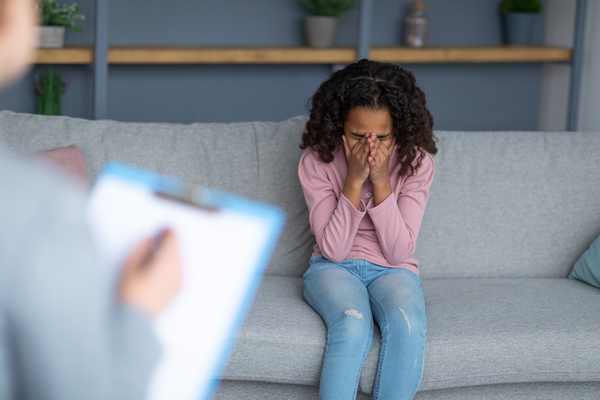
A Guide to Post Traumatic Stress Disorder (PTSD) in Children and Teens
Post-traumatic stress disorder (PTSD) is a condition that affects individuals who have experienced a traumatic event. While often associated with military combat, PTSD can also impact children and teens who have undergone a traumatic experience such as abuse, natural disasters, or violence.
PTSD can manifest itself in a variety of ways including flashbacks, nightmares, and avoidance behaviours. If left unaddressed, trauma can negatively impact a child’s development and well-being.
Caring for a child with post-traumatic stress disorder can be an incredibly challenging experience for parents and caregivers. This guide aims to help caregivers understand PTSD in teens and children and recognize the symptoms. We will also explore evidence-based strategies on how to help a child with PTSD build resilience for the future.
What Type of Trauma Can Cause PTSD in Children/Teens?
Childhood trauma can have a lasting impact on a young person’s mental health and can come in all shapes and sizes, including:
- Physical or emotional abuse
- Sexual assault
- A natural disaster or fire
- An unexpected death of a loved one
- School or neighbourhood violence
- Being the target of hate or threats of harm
- Car accidents
- Military combat
- Arrests of a friend or family member
- Evictions
Signs and Symptoms of PTSD in Children and Teens
The effects of childhood trauma are often invisible, making it difficult for outsiders to recognize the severity of the situation. However, children with PTSD and child-traumatic stress will often exhibit these signs and symptoms:
Physical:
- Headaches
- Stomach aches
- Other unexplained aches and pains
Emotional:
- Difficulty regulating their emotions
- Nightmares and flashbacks
- Emotional numbing
- Guilt or shame
- Difficulty trusting others
Behavioural:
- Avoidance
- Hyperarousal
- Regressing to behaviours they had outgrown, (e.g., bedwetting or thumb-sucking)
- Changes in school performance
- Self-destructive behaviours
- Increased irritability, anger, or sadness
- Sudden mood swings
How Is PTSD Diagnosed in Children and Teens?
Diagnosing PTSD in children and teens can be difficult because they may not be able to clearly articulate their symptoms or feelings.
Doctors and mental health professionals, however, can use various methods to diagnose PTSD, including interviews with the child or teen, observation of their behaviour, and the use of diagnostic tests and scales.
Effective PTSD Treatment Options for Children and Teens
It is important for parents to seek professional help if they suspect their child or teen has PTSD, as early diagnosis and treatment can help alleviate the symptoms and improve their quality of life.
Trauma-Focused Cognitive Behavioural Therapy (TF-CBT)
TF-CBT is a highly effective treatment option for children and teens who have experienced trauma and are struggling with post-traumatic stress disorder. This therapy focuses on helping individuals understand their thoughts, feelings, and behaviours related to the traumatic event, while also teaching them coping skills to manage their symptoms.
Art and Play Therapy
Art and play therapy are often used in conjunction with other forms of therapy for kids with PTSD, such as TF-CBT. These methods allow children and teens to express their emotions and experiences through creative activities, which can be less intimidating than traditional talk therapy.
Eye Movement Desensitization and Reprocessing (EMDR)
EMDR is a form of psychotherapy that has been found to be effective in treating PTSD in both children and adults. This technique involves recalling the traumatic event while engaging in bilateral stimulation, such as eye movements or hand tapping. EMDR helps children and teens process childhood trauma in a safe environment, leading to a reduction in symptoms.
Intensive Trauma Therapy
Intensive trauma therapy involves a more structured approach to treatment, typically involving multiple sessions per week for several weeks. This type of therapy is often recommended for individuals who have experienced severe or prolonged trauma. It can include various techniques such as exposure therapy, cognitive restructuring, and relaxation training.
Mindfulness and Relaxation Techniques
Practicing mindfulness and relaxation techniques can help children and teens manage their PTSD symptoms by reducing stress levels, improving sleep quality, and increasing their overall well-being. When used as a PTSD treatment, mindfulness and relaxation techniques may include deep breathing exercises, meditation, yoga, or progressive muscle relaxation.
Family Counselling
Family counselling or trauma counselling can be beneficial for children or teens who have experienced trauma as it involves the entire family unit in the healing process. Child counselling services can help improve communication, strengthen relationships, and provide support to both the individual and their family members.
Medication
In some cases, medication may be prescribed as a PTSD treatment to help manage symptoms in children and teens. Common medications may include antidepressants or anti-anxiety medications, which can help reduce symptoms such as flashbacks, nightmares, and anxiety.
Group Therapy
Group therapy can provide a supportive environment for children and teens with PTSD to connect with others who have had similar experiences. It can also offer a sense of belonging and understanding while learning coping skills from peers. Group therapy may be especially beneficial for individuals who feel isolated or alone in their struggles with PTSD.
How Family Matters Centre Can Help Children and Teens with PTSD Treatment
At Family Matters Centre, we can help your child cope with the trauma they have experienced. Our psychotherapists in Burlington specialize in PTSD treatment for children and teens. Through various evidence-based treatments such as cognitive-behavioural therapy and trauma-focused therapy, your child will learn new coping skills and strategies to manage their symptoms effectively.
If you’re looking for a child or teen therapist in the Burlington, Hamilton, or Oakville area, call us today at (905) 466-8023 or fill out our contact form to request an appointment. We are committed to helping your child achieve a happy, healthy life.

by Shari Markovich
Shari is a Child Therapist who has worked with children and adolescents for more than 20 years. She uses a variety of counselling modalities, including Theraplay®, Cognitive Behavioural Therapy (CBT), and Family Systems. She is motivated to work with children and parents so families can function in healthy and supportive ways.



